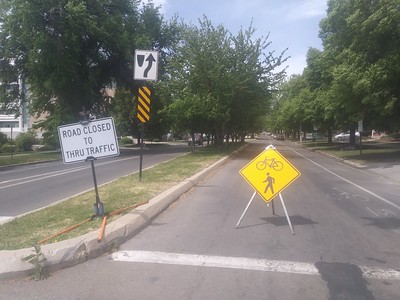600 East between 200 and 400 South prioritized for pedestrians and bicyclists, Salt Lake City


While of course I support any effort to rebalance street right of way to better serve pedestrians, bicyclists, and transit users, it's tough to do in places where mobility is dominated by the automobile.
This example illustrates the point I make that you need a lot of pedestrian/cyclist activity to make this work. A couple people crossed from one side of the street to the other, but otherwise there were no people. And this is an area with a lot of retail and a major spine for the light rail and bus system.
My recommendation always is to start small, on a block or two where there is already high pedestrian activity, and not think about long stretches, until you have the activity that can support.
And the corollary of this point is to start where you know you'll be wildly successful. This is necessary because especially in an automobile-dominated land use and transportation paradigm you're going to get a lot of pushback.
Empty sidewalks, pedestrianized blocks, and bike lanes make it that much harder to expand and create more spaces for pedestrians, cyclists, and transit users.
Labels: bicycle and pedestrian planning, sustainable mobility platform, urban design/placemaking



5 Comments:
Apparently DC is pretty begrudging about similar acts. The Mayor isn't supportive. (Not a surprise to me. She lives within a couple blocks of the DC-Maryland line, and grew up in the car-centric Michigan Park neighborhood.)
https://streetjustice.substack.com/p/dc-isnt-like-other-cities-opening
Bike usage in DC has picked up; still I'd stay less than normal in Ward 1. Better weather (April was cold/rainy) is helping. We'll see about bike commuting.
I've been looking at this for two days:
https://newatlas.com/bicycles/specialized-turbo-vado-sl-urban-ebikes/
also this:
https://www.nytimes.com/2020/05/18/nyregion/bike-shortage-coronavirus.html
Informally some of the "crazier" people (who are most worried about virus exposure) are threatening to take a bike to work, etc. I don't think they will follow through.
with my habit to add stuff to past entries in the comments section, recently on a couple pieces I've put in cites relating to "e-bikes can replace second cars" (Bloomberg) and articles from the Guardian.
For now, I am ok biking a traditional bike. But I must say I'm not riding near as fast, and if I want to avoid some super gnarly hills, I have to go out of my way many blocks to do it.
I can ride up the hills, depending on the street, but it is tough.
In short, in a few years, I can definitely see switching to an e-bike.
I do think it can be overkill in the core of a city. But maybe not. What has pushed you to considering it?
Cabi frame/geometry was killing my knees. Had to stop using it.
Tired of walking home in summer humidity -- the electric scooter made it much less of a pain.
regular commuter is about 2 miles by scooter and that is really about the limit. Safety issues and road quality make it harder. An ebike would be nice.
Although you're right -- probably overkill. I just want one with about a 10 mile range and a throttle to get you moving from a stop.
https://www.ft.com/content/488d5886-c6af-4e80-a479-36aca26edd1d
(free to read)
Would you take on longer trips, perform errands, etc., with an e-bike when you wouldn't otherwise?
Especially with the death of Car2Go? I can't remember if you got a car? If not, what about Free2Move?
-------------
WRT the FT article this is gonna be an issue.
Apparently the reopened NYSE won't allow people in if they ride public transit.
https://www.nyse.com/publicdocs/nyse/markets/nyse/rule-interpretations/2020/NYSE%20IM%20(5-14-20)%20-%20Final.pdf
***
Members may be present in the Facilities on or after May
26, 2020, only if they comply with the following requirements:
-- avoid public transportation by arranging alternative forms of transportation to and
from the Facilities;
***
OTOH, we've discussed the dense city vs. other places issue. i.e., a SmartCar doesn't really make sense in a lot of places but does in cities like DC, NYC, Boston, SF.
How could preferencing/incentivizing smaller cars for cities be done?
If we were the Netherlands, there would be big excise taxes on larger cars and smaller excise taxes on smaller cars.
Similarly, it wasn't my idea but in the 2001 SNAP plan process in the H Street neighborhood, someone suggested that residential parking permit prices should be weighted according to the size of the vehicle.
OTOH, in a covid19 environment, you're not gonna want to use a carshare vehicle probably.
Post a Comment
<< Home